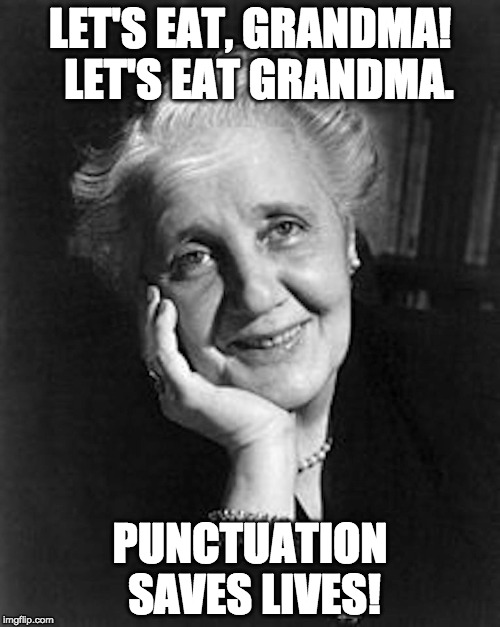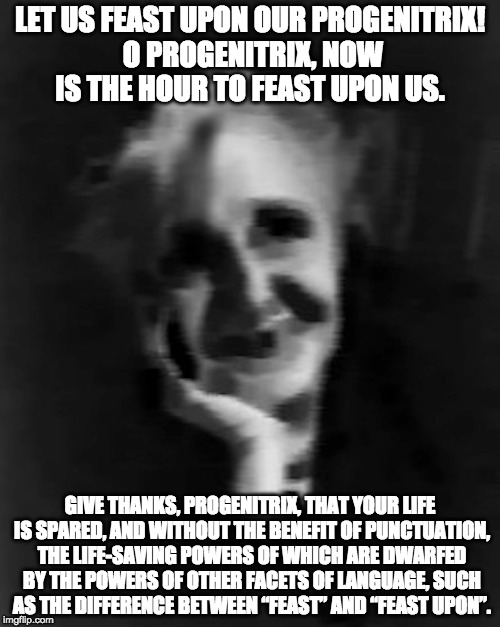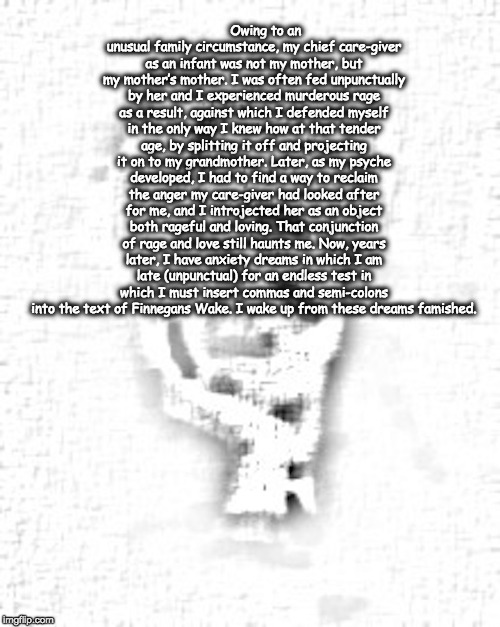Projective identification is an unconscious phantasy in which aspects of the self or an internal object are split off and attributed to an external object.
The projected aspects may be felt by the projector to be either good or bad. Projective phantasies may or may not be accompanied by evocative behaviour unconsciously intended to induce the recipient of the projection to feel and act in accordance with the projective phantasy.
In analysis, the patient projects parts of their mind into the analyst and then, subtly and unconsciously, strives to get the analyst to act in conformity with it. If the patient, for example, has aggressive and sadistic phantasies they cannot assimilate, they will attempt to elicit aggressive and sadistic behavior from the analyst. It is both a dangerous and valuable game.
Clear writing, too, is aggressive and sadistic – not in its content but in the domination it attempts. The reader is ‘forced’ to look here and not there (where their own phantasies might take them), to disregard this but to give that a lot of weight, to understand something polysemous in one way and not another. I imagine that what is being projected through this mechanism is the writer’s own anxiety, anxiety about confusion, about uncertainty, about getting lost, about being swallowed up by a messy, stinking pile of conceptual detritus. Writing clearly makes the writer work hard to control what they produce and at the same time, disallows anyone else the freedom to just let it all go.
I, certainly, whose care and intellectual hygiene so routinely earns me praise from my readers, am beset by these anxieties.†
My book-in-progress, A Certain Gesture: Evnine’s Batman Meme Project and Its Parerga!, exhibits my internal struggles around these issues. I have sometimes said that a key way of understanding its organization is through the analytic concept of free association. Free association is a mode of talking which deliberately tries to set clarity aside. As in free association, so in my book, one thing leads to another not through linear logic but through chance associations, phantasy, and play. The book as a whole does not ‘add up to anything.’ Not making any point, it cannot have a telic structure. It can be read in any order. The emphasis placed on the parergon means that the work is not even sharply divided from what lies outside it. ‘The work’ barely exists at all. What could be messier than a work that cannot be distinguished from its frame? Or even from its didactic?
Concurrently with work on my book, anxieties about free association in analysis have been gradually soothed so that now, after 8 years, I finally find myself occasionally able to talk freely. It’s a great feeling.‡ I look forward, too, to writing philosophy that is no longer ‘clear’ but manages to be interesting or profound instead.
† I have written here about my horror of things like nonsensical words in children’s songs .
‡ Anton Kris, in his book Free Association: Methods and Process, emphasizes the effect of free associating on the patient’s well-being.




I find this post both profound and exceptionally clear.
LikeLike
Why think that being clear conflicts with being interesting or profound? I think the main motivation for writing clearly is to put oneself as making claims that can be right or wrong and that are based on evaluable reasons (reasons that can be good or bad), and as being willing to be corrected on those matters. Whenever one is not willing to write clearly, one is not guided mainly by such motivation. That is not necessarily bad, but for the same reason I also don’t see nothing necessarily sadistic, aggresive or imperialistic in clear writing. It forces no one to play the game, it just makes clear what are the rules of the game if you want to play it.
LikeLike
I think you’re onto something when you point out the authoritarian impulses behind the author’s striving for clarity. it does seem that clear prose, especially as professional analytic philosophy envisions it, is *designed* to colonize the interlocutor’s mind. But, of course, that doesn’t mean it realizes its intent.
Slavishness, if such there be in a given case, is on the reader, not the writer. Part of the pleasure of reading is following trains of thought that are not one’s own — but the pleasure only comes by *taking it upon oneself* to follow along, by working to see things as the author does. After one has freely chosen to follow along, after one has worked oneself into the perspective of the author, then one can either submit or not. Of course, the best experiences of reading great ideas include a wonderful, unchosen shift in the reader’s perception of things, but that takes place within the context of the reader’s choosing to read, deliberately following along, etc. It’s a sadly servile reader who simply scans the lines and forces his mind not to wander places the author doesn’t intend or allow.
LikeLike
If your articles are often praised for being clear and not as profound or interesting, then what makes you think changing your prose will lead to the latter? If anything, being less clear can lead to confusion and headaches. Also, a lot of us are overconfident about the profundity of our ideas.
LikeLike
As a hobby, I solve puzzles with a team. In that setting, it’s important to communicate one’s ideas clearly, so that one’s ideas can be efficiently evaluated (usually, shot down) and then tried. For this reason, we all strive to be painfully clear, much like in philosophy. Do you think we are all implicitly trying to dominate and colonize our teammates’ minds? I’d have thought we were just trying to win.
I’d like to think that my own desire for clarity within philosophy serves a similar function, insofar as investigating philosophical problems can be thought of as akin to solving puzzles collaboratively. I’m trying to get to the truth efficiently, and if people are generous enough to read a single word I write, I don’t want to waste their time by forcing them to spend time and effort interpreting my ambiguous words. If you prefer a more pessimistic psychological story, maybe I am simply trying to get money or fame… or have others think I’m smart or something. But, I don’t find within myself a desire to colonize the minds of my readers.
Maybe I’m just not a very clear writer.
LikeLike